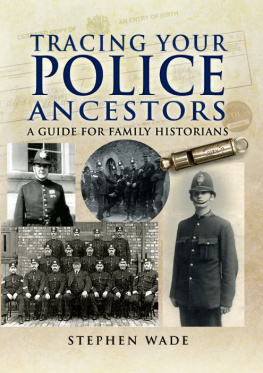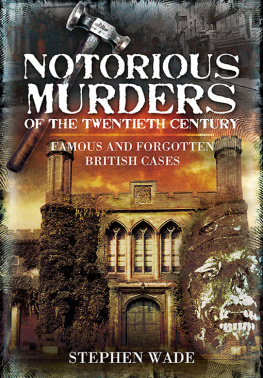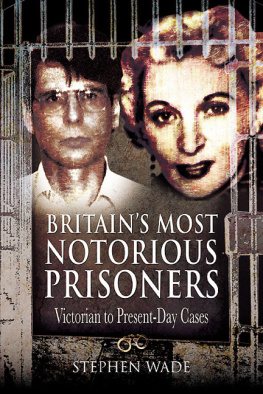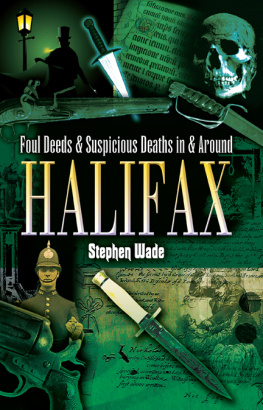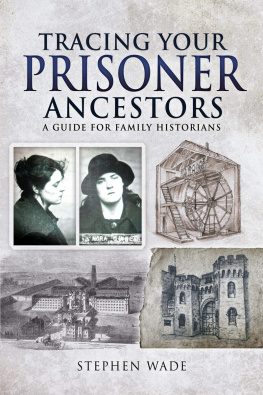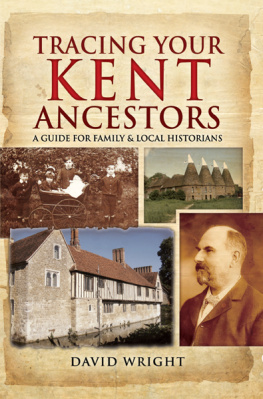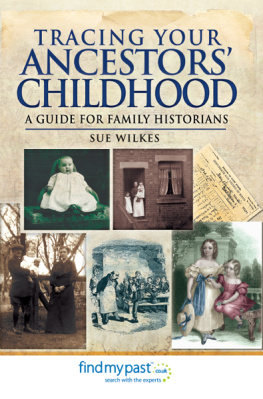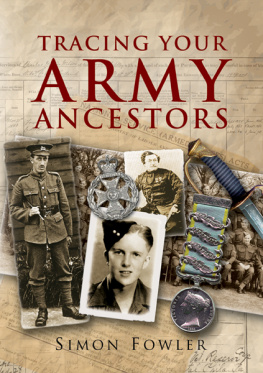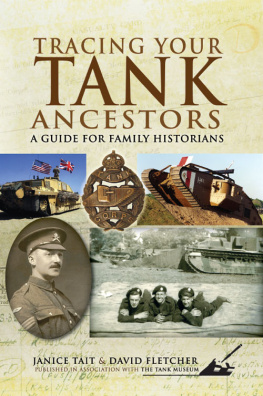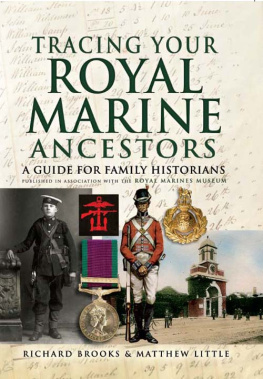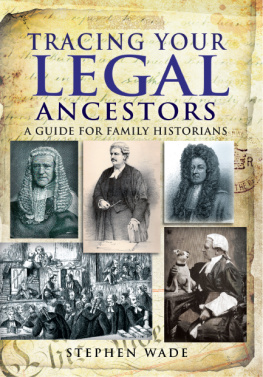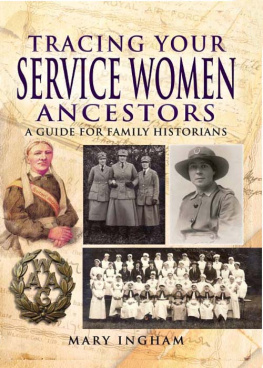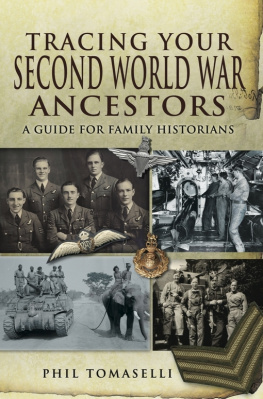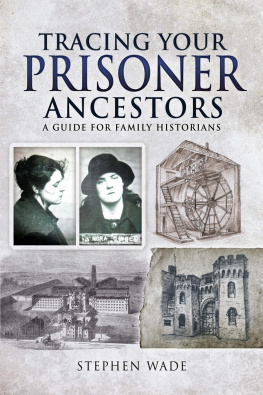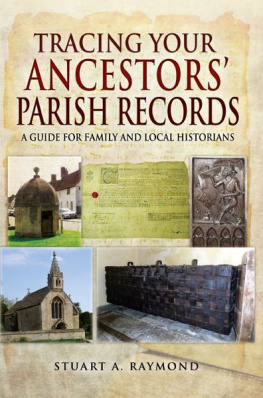
Other Titles in Pen & Sword Family History
Tracing Your Yorkshire Ancestors
Rachel Bellerby
Tracing Your Royal Marine Ancestors
Richard Brooks and Matthew Little
Tracing Your Army Ancestors
Simon Fowler
A Guide to Military History on the Internet
Simon Fowler
Tracing Your Northern Ancestors
Keith Gregson
Your Irish Ancestors
Ian Maxwell
Tracing Your Textile Ancestors
Vivien Teasdale
Tracing Your Air Force Ancestors
Phil Tomaselli

First published in Great Britain in 2009 by
PEN & SWORD FAMILY HISTORY
an imprint of
Pen & Sword Books Ltd
47 Church Street
Barnsley
South Yorkshire
S70 2AS
Copyright Stephen Wade 2009
ISBN 978 1 84415 878 2
Digital Edition ISBN: 978 1 84468 219 5
The right of Stephen Wade to be identified as Author of this Work has been asserted by him in accordance with the Copyright, Designs and Patents Act 1988.
A CIP catalogue record for this book is
available from the British Library.
All rights reserved. No part of this book may be reproduced or transmitted in any form or by any means, electronic or mechanical including photocopying, recording or by any information storage and retrieval system, without permission from the Publisher in writing.
Typeset in Palatino and Optima by
Phoenix Typesetting, Auldgirth, Dumfriesshire
Printed and bound in England by
CPI UK
Pen & Sword Books Ltd incorporates the Imprints of
Pen & Sword Aviation, Pen & Sword Maritime, Pen & Sword Military, Wharncliffe Local History, Pen & Sword Select, Pen & Sword Military Classics and Leo Cooper.
For a complete list of Pen & Sword titles please contact
PEN & SWORD BOOKS LIMITED
47 Church Street, Barnsley, South Yorkshire, S70 2AS, England
E-mail:
Website: www.pen-and-sword.co.uk
ACKNOWLEDGEMENTS
T hanks are due to Roger Appleby of the City of London Police Museum; Crispin Williams of Shaw & Sons, for permission to use the image of the Police and Constabulary Almanac; Lincolnshire Archives Illustrations Index, and the Essex Police Museum for the images as credited. The picture of the police ambulance is reprinted by permission of the Greater Manchester Police Museum. Staff at the East Riding Archives and at Lincolnshire Archives were most helpful in guiding me to the relevant material, and equally the staff at the London Metropolitan Archives took the time to answer queries. Conversations with retired officers proved useful also, as a certain element of oral history is clearly of great assistance in an enterprise such as this.
As always in writing history, there are pathfinders to thank as well, in this case Les Waters and his Police History Society monograph. This was the first publication that attempted to bring together the various strands of material involved in this research. Other progress is down to members of the Police History Society and individuals such as Fred Feather, Dr John Bond and Paul Williams, as mentioned in the Bibliography.
A TIME-LINE FOR POLICE HISTORY
| 1750s | Henry and John Fielding active as London magistrates. Bow Street Runners formed, originally consisting of the only six of the eighty Constables in Westminster not on the take (Oliver Cyriax, The Penguin Encyclopaedia of Crime). |
| 1796 | Publication of Patrick Colquhouns book, A Treatise on the Police of the Metropolis. |
| 1829 | Metropolitan Police Act. Robert Peel forms the first professional force, for London. |
| 1835 | Municipal Corporations Act. This brought about the formation of Watch Committees, created by boroughs. |
| 1836 | The Royal Irish Constabulary formed by Thomas Drummond. |
| 1837 | John Kent, the first black police constable, joins the Carlisle force. |
| 1839 | The formation of the City of London Police. |
| 1842 | The first detective force formed. |
| 1839 | The County Police Act. This gave boroughs the option of forming a constabulary if the justices wanted to levy a rate for that purpose. |
| 1856 | The County and Borough Police Act. This made it compulsory for all counties in England and Wales to establish police forces. |
| 1874 | The Criminal Investigation Department established. |
| 1890 | Police Pensions Act. Under this Act, receipt of a pension after 25 years service became a right. |
| 1911 | Captain Horwood becomes the Chief Officer of the Eastern Railway Police. (He later became Commissioner of the Metropolitan Police.) |
| 1915 | The first woman police officer appointed (Edith Smith, Grantham). |
| 1917 | The first policewomen are sworn in for service in the Transport Police for the North-Eastern Railway. |
| 19181919 | Police strikes in London and Liverpool. |
| 1920 | The Police Pensions Act. This defined the age limit for each rank at retirement. |
| 1920 | Creation of the Palestine Police Force. |
| 1922 | The Royal Ulster Constabulary is formed. |
| 1924 | The Metropolitan Police start to relinquish dockyard duties. |
| 1924 | Ada Atherton starts work at Waterloo as a female detective for the Transport Police. |
| 1930 | A sign of changing times: large numbers of officers begin traffic patrol work. |
| 1932 | The beat system is abolished by Lord Trenchard. |
| 1933 | The Metropolitan Police College at Hendon is opened. |
| 1934 | The Metropolitan Forensic Laboratory is opened. |
| 1941 | PC William Brereton is awarded the British Empire Medal for gallant conduct. During an air raid on a goods depot in South London he saved the life of PC Rowing inside a burning building. |
| 1948 | The British Mandate for Palestine ends: the Palestine Police Force is disbanded. |
| 1955 | The Central Traffic Squad is formed: a hundred men are involved in this. |
| 19631975 | Gradual rationalisation of forces and disbandment of many smaller constabularies. |
| 1965 | The Special Patrol Group is formed: 100 officers arrest 396 people in the first year of work. |
| 1966 | Norwell Roberts joins the Met. as the first black police officer in that force. (He was to receive the Queens Police Medal in 1996.) |
INTRODUCTION
Survey of Sources
The history of the professional police force in Britain presents the historian of law and crime with a very full and detailed record. For the family historian, however, that is not the case. It is a simple matter to find out what the various police archives contain, but problems arise from the fact that many of the useful records are not where logic might dictate they should be found. Many police staff records, or even documents that contain information about constables, are either simply not available or perhaps dispersed across a range of sources.
Next page
